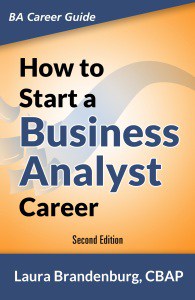A software developer is a professional who designs, creates, and customizes software applications to meet the business and functional requirements which are typically analyzed and specified by a business analyst.
The Skills Software Developers Bring to a Business Analyst Position
Because of their technical know-how and familiarity with software development, many people-oriented software developers opt to transition into business analysis roles. When talking to software developers who are now business analysts, you’ll often hear them say something like, “I was the technical person who didn’t mind talking to people, so they put me in charge of talking to the users about what they wanted.”

The biggest transferable skills software developers bring into business analysis is that they’ve worked on a typical project and they tend to understand the possibilities of technology, which makes it easier for them to understand what technical solutions to a business need might look like.
They also tend to be highly analytical, and this helps them with the requirements process. They may even have experience creating certain types of requirements documentation, albeit often what they feel is an informal process.
That’s OK – it’s perfectly possible to present yourself of going requirements specifications even if you’ve only created informal documentation.
Opportunities for Software Developers to Expand their Business Analyst Experience
To grow into a business analyst role, software developers need to explore the following types of opportunities:
- Reach out proactively to business stakeholders and end users to understand the big picture process and how the software will solve a problem or meet an underlying business need.
- Learn to communicate in business terms and save the technical jargon for conversations with other software developers.
- Be sure to ask questions to discover what the business wants and needs the software to do, rather than make assumptions based on what it’s easiest to make the software do. Developers can tend to get caught in solution mode, and it’s important to understand the true business problem before coming up with solutions.
In general, as a software developer you need to take steps toward the business side of the project, even if you are planning to work as a BA on an IT project.
Case Study: From Software Development to Business Analyst – Landing Paid Contract Work Along the Way
Todd Fleming is from Somers Montana, which is near Kalispell, Montana, and leveraged his investment in The Business Analyst Blueprint® to land paid contract work with a past employer, and the opportunity to build up his on-the-job business analyst experience.
Case Study: From Software Developer to Business Analyst to BTG Instructor
Learn how Disha Trivedi transitioned into a business analyst career from software development, and the career trajectory that’s led her to being an instructor with Bridging the Gap.
More Case Studies of Software Developers Becoming Business Analysts!
To further explore how the transition from software development to business analysis works, check out these career transition success stories:
From Software Developer to Business Analyst – Wendy Stookesberry created momentum in her business analyst career by volunteering to do a business analysis task and eventually earned an internal promotion into business analysis.
Building BA Experience as a Software Developer – Dave’s story shows us how a little persistence and creativity can go a long way. Dave’s organization does not have a BA practice and he has many software development responsibilities to attend to, yet he has managed to expand his experience and begin qualifying himself for more BA roles.
From Software Developer in an Informal Environment to Business Analyst – Michiel shares the ups and the downs, and his strategies for staying focused on his goals even during what was a difficult transition path.
>> Find Your Path Into Business Analysis
After reading and working through the exercises in How to Start a Business Analyst Career, you’ll know how to assess and expand your business analysis skills and experience.
This book will help you find your best path forward into a business analyst career. More than that, you will know exactly what to do next to expand your business analysis opportunities.
Click here to learn more about How to Start a Business Analyst Career

